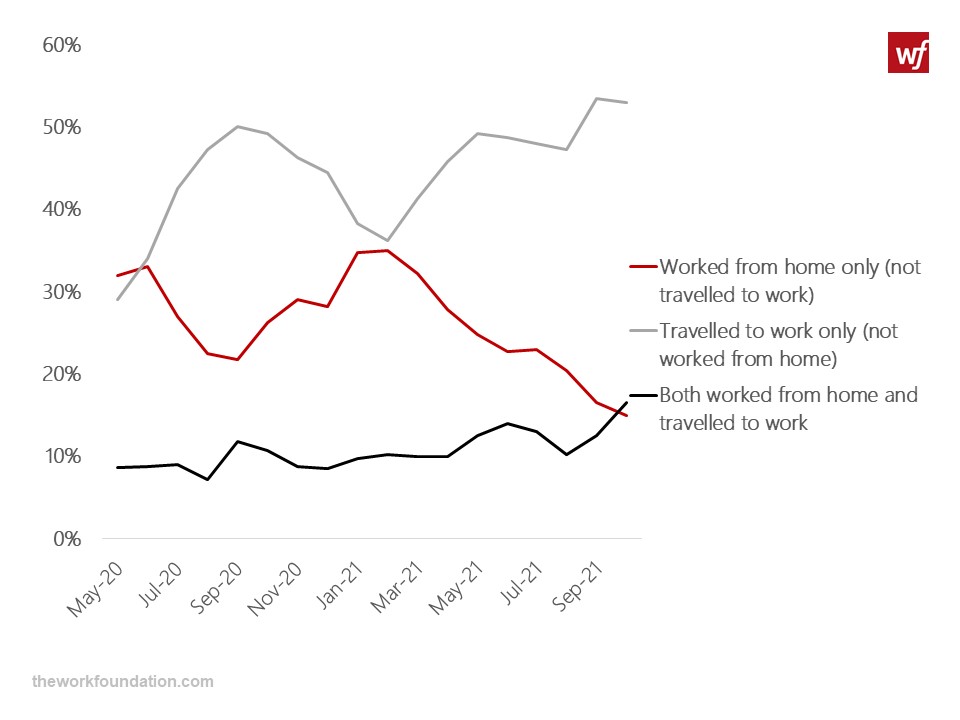Remote and hybrid work are here to stay
Posted on

The pandemic led to a rapid increase in take-up of remote and hybrid working, representing a large scale and likely long-lasting transformation of our working lives. The Work Foundation has closely tracked this trend. Over the past year, we have gathered evidence and generated insights around the benefits and challenges that remote work poses to workers’ wellbeing, organisational culture and workplace inequalities.
The Work Foundation’s research on remote and hybrid work
Our research investigated:
- the impact of remote working on businesses and workers in the North of England, together with Newcastle University Business School.
- what needs to happen to make hybrid inclusive, addressing the risk of widening inequalities in the workplace for carers, parents, women and disabled workers, for which we partnered with the Chartered Management Institute.
- the challenges (and opportunities) that remote working creates for workers starting new roles, in “interning in lockdown” for which we engaged with Lancaster University’s career services.
Key findings from the research
Prior to the pandemic, approximately 6% of people across the UK worked exclusively remotely. This increased to 31% during the first national lockdown and has remained high, as shown in the figure below.
During this time, employers and workers have invested in the physical capital as well as the skills that are required to work remotely, making it possible, and likely, that remote working will remain prevalent post-Covid. This is accompanied by a shift in preferences, with our survey of workers finding that 1 in 9 workers who are currently working remotely want to continue to work remotely at least one day a week.
Figure 1: Percentage of working adults that in the past 7 days worked from home, travelled to work, or did both.

Source: ONS Opinions and Lifestyle Survey (Covid-19 module), 2020 to 2021. 11 November 2021.
Importantly, the shift to remote and hybrid working during the pandemic has accelerated take up of digital technologies and managed to overcome long standing organisational barriers to change, especially in sectors such as Manufacturing.
Remote working was found to have mixed implications for wellbeing
While for many workers access to remote and hybrid work has brought clear benefits, some will have experienced lower levels of wellbeing. Risk factors include the inability to disconnect from work and work-related devices and not having an appropriate place to work, which was particularly felt by young workers and those from less affluent socio-economic backgrounds.
Feelings of isolation were also a widespread concern, for some a direct result from organisational policies. For example, some firms dealt with security concerns by obliging remote workers to work away from other members of the household. This had negative impacts on workers’ wellbeing and shows that transposing traditional concepts of ‘ways of work’ onto this new working arrangement is not sustainable in the long term.
After the lifting of restrictions on social contact in July 2021, we have witnessed a shift away from exclusive remote working towards higher levels of hybrid work. It is important to emphasize that not everyone can work remotely, and not everyone is suited to remote work. In this context, access to the broader spectrum of flexible work is key. There are many workers who may not want to, or able to work from home, but for whom working arrangements such as compressed hours, annualised hours, or jobshare might be instrumental in supporting them to thrive at work.
There is a risk that legacy attitudes to work will widen inequalities in the workplace
Importantly, the shift to hybrid means there is an enhanced risk that traditional ways of gaining recognition and securing progression at the workplace will continue to be tied to physical presence and visibility in the workplace, and that those who are working remotely will miss out.
Our research found that disabled workers, women, parents and those with caring responsibilities face particular challenges to their wellbeing and career development when working remotely, due to isolation from the office and potentially missing out on opportunities for learning and development.
What we are doing with the evidence we’ve gathered
We have made produced an Employer Guide to support managers and employers to capitalise on the benefits while mitigating the risks in this new way of working. We have also made recommendations to Government and policymakers in a policy brief.
We will, and encourage others to, respond to the ongoing BEIS consultation on flexible work, which is due to close on the 1st of December.
We will explore these issues further through an online event on 25th November; What Matters Now: Managing Hybrid Teams.
Building on our work over the past months, we will continue to investigate the impact that this shift in our way of working is having on businesses, people and places. Specifically, we will examine the experiences of disabled workers to understand the role that this form of work can play in providing access to, and remaining in, work.
Disclaimer
The opinions expressed by our bloggers and those providing comments are personal, and may not necessarily reflect the opinions of Lancaster University. Responsibility for the accuracy of any of the information contained within blog posts belongs to the blogger.
Back to blog listing

